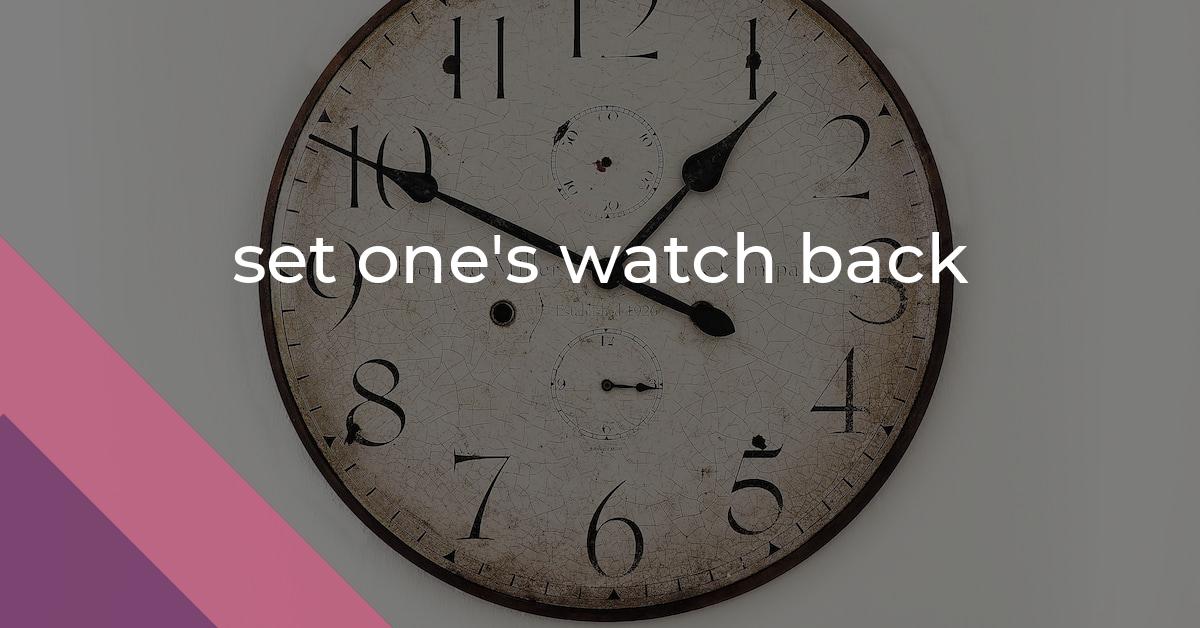set one’s watch back: Idiom Meaning and Origin
What does ‘set one's watch back’ mean?
"Set one's watch back" means to adjust the time on one's watch to an earlier time, often in response to changing time zones or to cheat or deceive others. It can also be used figuratively to mean regressing or going back in time.

Idiom Explorer
The idiom "turn back the clock" means to go back in time, undoing or reversing the effects of previous actions or events.
The idiom "step back" means to pause, reflect, or withdraw from a situation in order to gain a better perspective or understanding. It suggests the need to take a break and reassess the situation before making any decisions or taking further action.
The idiom "stay behind" means to remain in a place or position after others have left. It implies a deliberate choice to not move forward with others or to stay out of sight for various reasons.
The idiom "start over" means to begin again or to make a fresh start after a setback or failure.
The idiom "stand pat" means to refuse to change one's position or opinion, especially in the face of opposition or pressure to do so.
The idiom "stand in one's own light" means to do something that hinders or harms one's own progress, success, or reputation.
The idiom "stall for time" means to intentionally delay or prolong something in order to gain additional time, usually to think or plan a response.
An idiom meaning to betray someone or deceive them dishonestly, often when they least expect it.
The idiom "square one" means to be back at the beginning or starting point, often after a setback or failure.
The idiom "slow up" means to decrease the speed or tempo of an activity or process. It suggests a delay or a slowing down in progress.
FAIL
"put the clock forward" is a related idiom to "set one's watch back." It means adjusting the time on a clock or watch to a later hour. This idiom is commonly used in the context of daylight saving time, where people move their clocks forward by one hour in the spring to make better use of natural daylight. It is the opposite of setting one's watch back, as it involves advancing the time forward.
Another related idiom is "put the clock back." Similar to "set one's watch back," this idiom refers to adjusting the time on a clock or watch to an earlier hour. It is often used in the context of the end of daylight saving time, where people set their clocks back by one hour in the fall. This practice aligns with the idiom's meaning of setting the clock back to an earlier time.
"turn back the clock" is yet another related idiom. It is used to describe the act of reverting to a past state or time. This idiom is often employed in the context of nostalgia or longing for an earlier period. It conveys the idea of going back in time, much like the idiom "set one's watch back."
Lastly, the idiom "set back" is similar in meaning to "set one's watch back." It can refer to adjusting the time on a clock or watch to an earlier hour. However, "set back" can also have a metaphorical usage, meaning to delay or hinder progress or development. This usage suggests setbacks or obstacles that prevent forward movement.
Overall, the idiom "set one's watch back" is related to idioms such as "put the clock forward," "put the clock back," "turn back the clock," and "set back." These idioms all revolve around adjusting the time on a clock or watch in different ways. They convey the idea of going back in time and can be used in various contexts, from time management to reflecting on the past.
Example usage
Examples:
- Since we will be traveling to a different time zone, we'll need to set our watches back by three hours.
- Don't forget to set your watch back tonight before going to bed, as daylight saving time ends.
- She always forgets to set her watch back after traveling, which makes her late for appointments.
More "Time" idioms



